Emil's Epilogue -
November 2011 Gustie Psych News & Events
Philanthropy...
These are very exciting times for the Psychology department as a whole. Not only have we moved from the obscure basement in SSC to a brand new building with state of the art classrooms and teaching spaces, but we also now (finally) have lab spaces and designated areas for psychology students to gather and discuss.
Now, as we all know, none of all this comes without a cost. A financial cost that is. However, and perhaps most surprisingly in these times of economic debacle, it seems as our department is doing just fine in this last respect too. Gustavus psychology majors are directly benefited by the active philanthropy of the Rev. Gordon A. Braatz, Ph.D..
Dr. Braatz is an ordained minister in the Evangelical Lutheran Church in America. A clinical psychologist, he has been  actively engaged in psychological practice as well as parish ministry for more than thirty years. Among other credentials, Dr. Braatz obtained his Ph.D. in Clinical Psychology from the University of Minnesota, he is a member of the American Board of Professional Psychology, a Supervisory Psychologist at the Department of Veterans Affairs, and for many years was an Adjunct Faculty in Psychology and Psychiatry at the University of Minnesota. Perhaps, though, most importantly for Gusties, he is a member of the Board of Trustees at Gustavus (which his mother attended), and shares an active interest in providing opportunities for psychology majors.
actively engaged in psychological practice as well as parish ministry for more than thirty years. Among other credentials, Dr. Braatz obtained his Ph.D. in Clinical Psychology from the University of Minnesota, he is a member of the American Board of Professional Psychology, a Supervisory Psychologist at the Department of Veterans Affairs, and for many years was an Adjunct Faculty in Psychology and Psychiatry at the University of Minnesota. Perhaps, though, most importantly for Gusties, he is a member of the Board of Trustees at Gustavus (which his mother attended), and shares an active interest in providing opportunities for psychology majors.
Under his generous support, the psychology department has been able for the last three years to implement a summer research opportunity for students staying on campus, and will be able to continue doing so for at least the next five. During the summer of 2011, Hannah Durbin ’13 worked with Dr. Hecht on a project looking at facial processing in different races using an eye-tracker device, while Jenna Chapman’12 worked with Dr. Robinson on a project regarding facial affect processing in high social anxiety using an fNIR apparatus. Both Hannah and Jenna have continued working on these projects into the school year, an experience that will undoubtedly serve them well as they look toward futures beyond Gustavus.
Dr. Braatz states, “My motivation for underwriting summer research, and providing dedicated funding for a room in the new classroom building [the psychology student interaction room], stems from my own experience as a research assistant while I was a graduate student, and later as I did my dissertation research. After forty years as a psychologist, I want to do what I can to provide students with hands-on experience early, not only to foster their own research endeavors as the years move on, but so that they will be more informed consumers of the research they read about. My early experience has stayed with me  in a very positive way. I'm delighted if in a small way I can help others to have that experience too”.
in a very positive way. I'm delighted if in a small way I can help others to have that experience too”.
by - Jean Paul Noel
[Jean-Paul is a Senior Psychology Honors major and Neuroscience Minor. He is also a Spanish Tutor and a Psychology Academic Assistant. Jean Paul is employed as a student assistant in the Psychology Department and is a member of the Emil's Epilogue staff. Currently applying for a Fulbright Scholarship, he intends to eventually attend graduate school for Cognitive Neuroscience.]
Psychology Major Studying Abroad - Elise Frischmann
I came to India at the end of this past August as part of the Gustavus Social Justice, Peace, and Development semester-long program. Before leaving home, I remember sitting at home and trying but failing to imagine what my experiences would be like in this new country. Would I be eating curry on banana leaves at every single meal? Would I be riding an elephant to class every morning? As a psychology major, I also had some slightly more academic questions, and was excited to 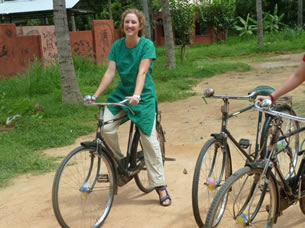 experience and try to understand life in India. However, I never expected that these very different experiences would lead me to reexamine my own life in the United States.
experience and try to understand life in India. However, I never expected that these very different experiences would lead me to reexamine my own life in the United States.
During our first week in India, we took a bus into the city of Bangalore to visit urban poor neighborhoods, more commonly known as slums. Stepping out of the bus, the sun shining and the sounds of city life all around us, we crossed a street buzzing with auto rickshaws and motorcycles to begin walking into the slums. Many people living in these neighborhoods are from the poorest and most disadvantaged groups in India. Although the caste system has been officially made illegal in India, its grip is still tight on Indian society. Members of the lowest group, the Dalits or ‘untouchables’, are actually considered to be outside of the caste system and face heavy discrimination. Many other people living in India’s urban poor communities have been displaced from their traditional lands because of industrial agriculture or the creation of large power and steel factories.
The living conditions in the slums were below sufficient: citizens had limited access to food, water, electricity, health care, and space to live. In one home that we visited, a family of eight had a space of about 10 feet by 10 feet to live and sleep in. However, despite these difficult conditions, the people in the slums were still living. I saw little girls walking down the street together, holding hands; a brother and sister were playing with toys on the ground; and a kind grandmother, a mother, and three daughters were glad to show us into their home. While the living conditions in the slums were very difficult and unjust, a spirit of life and humanity was still present.
This experience, as well as many others that we have had in the time since, have made me think about what it means to be a human being. Is being human about the income we receive, the type of car that we buy, or our social standing? Or is there something more? I still have a long ways to go in figuring out what it means to be human, and I will probably never 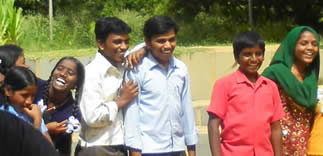
I have had an amazing time in India so far, and am very lucky to be studying abroad in this complex and beautiful country. My experiences here have caused me to start thinking about the US – what do I truly value in life? How do my actions affect others? What injustices are in place in our society, and how can I fight those? I still have a lot to learn in India, but I know that I will carry these experiences and memories with me for the rest of my life.
[Elise is a junior psychology and sociology/anthropology double major from Kimball, MN. She loves to read and be outside. Elise plays the trombone in the Gustavus Symphony Orchestra, the Gustavus Wind Orchestra and is a member of Psi Chi. She is really interested in the Occupy Wall Street movement right now, and after college and hopes to either go into governmental or non-profit work to try to achieve systematic change in our society.]
Marie Walker named community partner in Faculty Fellows Initiative
The new Faculty Fellows program in Community-Based Learning at Gustavus is a collaborative effort of faculty, students, and community partners to provide students with opportunities for meaningful community engagement, to address community needs and priorities, to build faculty learning communities of scholar-practitioners, and to more deeply integrate community-based learning into the academic programs of the college.
The Center for Servant Leadership is sponsoring the program under the leadership of Jeffrey Rathlef, director for community-based service and learning. The Faculty Fellows initiative has broad and unique possibilities to enrich learning in the classroom and beyond, through research, engagement, and partnership. In individual and group projects, students will work with faculty members and community leaders to inform and advance diverse community-based needs and priorities.
With each community partner, there will be different ways that their needs intersect with students skills.
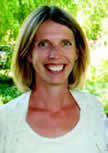 During the spring of 2012, Marie Walker (psychology) will be building on community-based research previously done in her abnormal psychology classes. She will continue to work with two community partners, Patty Pierson of Shiloh’s Hope, Inc., and Barb Christenson of Nicollet County Social Services, in assessing the need for a Crisis Response Team in Nicollet County. Students in Walker’s abnormal psychology class will gather additional information on crisis response teams, including types of crises to be encountered, the area to be served, healthcare and law enforcement professionals who might be assisted, legal issues, and funding possibilities for a mental health crisis response team in Nicollet County.
During the spring of 2012, Marie Walker (psychology) will be building on community-based research previously done in her abnormal psychology classes. She will continue to work with two community partners, Patty Pierson of Shiloh’s Hope, Inc., and Barb Christenson of Nicollet County Social Services, in assessing the need for a Crisis Response Team in Nicollet County. Students in Walker’s abnormal psychology class will gather additional information on crisis response teams, including types of crises to be encountered, the area to be served, healthcare and law enforcement professionals who might be assisted, legal issues, and funding possibilities for a mental health crisis response team in Nicollet County.
When in crisis, people with mental health issues may act in unexpected ways. “Currently, we have no crisis response team that serves all of Nicollet County,” said Walker. “The Mental Health Association of Minnesota has many wonderful advocacy resources available, but outside of the metro area, there is less information available to help individuals and their families with mental illness. There are just fewer resources in rural areas.” The research her students conducted in 2010 indicated that a need exists in the county for short-term mental health care for crisis help or consultation, and that this would be cost effective in reducing the strain both to the primary intervention worker and the families. The recommendation was supported by information from existing crisis response teams in other Minnesota counties: their composition, area covered, types of emergencies they respond to, training of officials, and beneficiaries of the team.
Additional information is needed: How would the public see this service? Interviews will be done with mental health practitioners, law enforcement, and other services that have contact with the population. “Not only do we want to compare the services in our area with what is available in other counties, but learn what is being done nationwide,” said Walker.
“We will also investigate other models for funding, and who would buy into creating this.” Awareness of mental health issues and the need for a crisis team would make it easier to get funding and acceptance for a crisis response team. A community forum might be a place to facilitate discussion and bring learning and the need for structure and support to another level. Ideas continue to emerge as Walker networks with colleagues and community partners.
Walker’s hope is that through this applied area of learning, the multiple aspects of the project will be woven together with community needs in a way that will have an impact, that students will develop confidence and recognize that what they have to offer makes a difference. The students will share their results and conclusions with the organizations and agencies that need the information, as well as with their professors. “I would hope students will have the opportunity to try something, to be a part of something bigger. Maybe they’ll feel empowered with the confidence to organize, and that this will take them on to something new—so they’ll say ‘Now I know what I want to do!’” - by Marilyn Beyer - Office of Church Relations - Spire - Fall 2011]
Amanda Feeks interviewed Dr. Walker regarding this appointment and writes the following: "This opportunity will allow  students in Dr. Walker's Spring 2012 Psy 241 class to be a part of change in the world and it has potential to guide them towards what they may decide to be a part of in the future. They can apply the research and problem solving techniques that they learn in this course to other situations in the world. This project is continuing to advance as Professor Walker meets and networks with other colleagues and gathers information and ideas about what other needs can be addressed. It is exciting to witness something of this nature at Gustavus Adolphus because it extends beyond the life of College and into the real world. Students are taking a step out of our realm of academics and assisting change that will help the community that we live in." - [Mandy is a Junior Honors
Psychology major from Apple Valley, MN. She is a member of Psi Chi,
involved in Intramural Sports and hopes to join BPLP this year. Mandy is
a student assistant in the psychology department and a staff member of
this newsletter.]
students in Dr. Walker's Spring 2012 Psy 241 class to be a part of change in the world and it has potential to guide them towards what they may decide to be a part of in the future. They can apply the research and problem solving techniques that they learn in this course to other situations in the world. This project is continuing to advance as Professor Walker meets and networks with other colleagues and gathers information and ideas about what other needs can be addressed. It is exciting to witness something of this nature at Gustavus Adolphus because it extends beyond the life of College and into the real world. Students are taking a step out of our realm of academics and assisting change that will help the community that we live in." - [Mandy is a Junior Honors
Psychology major from Apple Valley, MN. She is a member of Psi Chi,
involved in Intramural Sports and hopes to join BPLP this year. Mandy is
a student assistant in the psychology department and a staff member of
this newsletter.]
EGI training slideshow in the new Beck Social Neuroscience Lab!
Did you know that Dr. Phil started his career in forensic psychology?
by - Hannah Durbin
That’s right! Dr. Phil met Oprah while working as an advisor to lawyers doing jury selection, just one of the many occupations filled by forensic psychologists today. Just ask Dr. Jeffrey Haun, a psychologist who works for State Operated Forensic Services (SOFS) at the Saint Peter Regional Treatment Center. On a given day, his job consists of performing pre-trial and psychological evaluations of individuals charged with a crime that may have mental problems orare considered mentally ill and dangerous (MI&D), risk assessment for individuals committed as MI&D and wish to reduce their sentence, court testimony based on these assessments, or evaluating the potential risk of repeat sexual
offenders. He also works with postdoctoral interns and does research and didactic training with students under the postdoctoral fellowship program at SOFS. Despite his busy schedule, we are lucky enough to have him join us for another year as a visiting professor for his J-Term course, Forensic Psychology.
Forensic psychology is the intersection of criminal and civil justice and clinical psychology. Students who take the course will study a survey of topics that apply to the field, including witness testimony, police and prison psychology, insanity pleas, criminal evaluation, jury selection, civil commitment and sentencing. The course will also include a guest speaker who works as a criminal profiler and a field trip to the Saint Peter Regional Treatment Center Museum. Dr. Haun is particularly excited to teach on the topics related to social psychology, such as eyewitness testimony, and hopes that students will exit the course with “a more realistic understanding of the field of forensic psychology.”
Interested? Enroll in the course! Dr. Haun also advises students who wish to get more involved in the field to seek internship and mentoring opportunities, get involved in professional organizations (like the American Psychological-Law
Association), do research, volunteer/work in a clinical setting, and look for postgraduate programs with emphases on thelegal aspects of psychology. His firsthand experience makes him an invaluable resource for anyone with an interest inthe field, and as a former student of his I highly recommend taking the course. Who knows, you may become the next Dr. Phil!
[Hannah is a Junior Honors Psychology major and Neuroscience minor from Coon Rapids, Minnesota. She is also involved in Colleges Against Cancer and Study Buddies and will be declaring a second major in Spanish this spring.]
Interesting read! - AP: How Psychology Solved A WWII Shipwreck Mystery

AP
A gun turret on the sunken Australian warship HMAS Sydney. All 645 people aboard the Sydney died.
Published: September 27, 2011
In November 1941, two ships crossed paths off the coast of Australia. One was the German raider HSK Kormoran. The other: an Australian warship called the HMAS Sydney. Guns were fired, the ships were damaged, and both sank to the bottom of the ocean.
The loss of the Sydney in World War II was a national tragedy for the Australians, particularly.. continue the article on this link:
http://m.npr.org/news/front/140816037?singlePage=true
Faculty Presentations/Papers/Conferences
Professor Mark Kruger presented two papers this last summer. The first was presented at the annual meeting of the International Trumpet Guild held in Minneapolis, MN, May May 24-28. The paper was titled, “The Other Trumpet Player: Unconscious Strategies to Adjust Air Support with the Throat in Trumpet Performance” The paper was co-authored with Dr. Jon Kruger, Department of Fine Arts, Rochester Institute of Technology, and Dr. James McLean, Department of Physics, SUNY-Geneseo. The second paper was presented at a meeting of the Society for the study of Music Perceptionand Cognition, held August 11-14 in Rochester, NY. This paper was also done collaboratively with the Dr. Jon Kruger and Dr. James McClean. Its title was, “Individual differences in muscle tension and air support during trumpet performance.”
- Figure 1: The figure above shows chest expansion, muscle tension in the shoulder and back, sound, internally generated air pressure, and force on the mouthpiece (from top to bottom) during the performance of an ascending arpeggio by a skilled student performer. The increased tension seen in the second row as the player performs higher and higher notes is absent in professional performers.
Dr. Kyle Chambers co-authored a paper that was published in Language Learning and Development - Volume 7, Issue 4, 2011 - Special Issue: Cognition and Language "Representations for Phonotactic Learning in Infancy"
Spring 2012 - Psy 344 Topics
PSY 344 Advanced Topic: Psychology of Language - Dr. Kyle Chambers
"How are lol speak and txtng similar? Do birds, bees, and monkeys talk? Are your thoughts determined by the language you speak? Are women more talkative than men? Where does language come from? Does being
bilingual rot your mind? Are dogs better than children at learning words? These are just a few of the topics that we will consider in this seminar that takes an in-depth look at both the enduring and hot
topics in language research. In this seminar, we won't watch what we say, but we'll definitely study it."
PSY 344 Advanced Topic: Perception, Dr. Lauren Hecht
"Every day our brains process and interpret an enormous amount of sensory information, creating our perception of the world. In this course, we will discuss the theories, methods and techniques used to shape our understanding of how humans (and possibly even animals) create these perceptions of the external world. Discussions will include specific topics within visual and auditory perception, and are likely to include topics within touch, smell, and taste perception."
Photo captured at Nobel 2011
Tim Robinson '65, Tom Bergquist '83 and Anaya Mitra '03 at Nobel Conference 2011.
All Gustie grads...Dr. Robinson's special interests are neuropsychology; brain chemistry and animal behavior. Tom Bergquist is a neuropsychologist at the Mayo Clinic in Rochester and Anya Mitra is the newest member of the Psychology Department at St. Catherines.
Click here for previous Alumni Updates
Dates to mark on your calendar...
November 3, 2011 - Movie Thriller Beck 271 - 8:30 PM Silence of the Lambs
November 10, 2011 - Psy 234 - Museum Play Day (a partnership between Psy 234 Development classes and the Children's Museum of Southern Minnesota) Saint Peter Community Center
December 9, 2011 - Psychology Research Symposium - Beck Hall, Gustavus
The fall psychology research symposium will take place in Beck Hall on Friday, December 9. Psychology department research symposiums are held near the conclusion of the fall and spring semesters and provide opportunities for Gustavus students to acquaint themselves with research conducted in the psychology department during the semester. Students will display poster presentations and explain their research from 3:30 - 5:00 p.m.. The campus community is welcome.
April 28, 2012 - Minnesota Psychology Undergraduate Conference - hosted by GUSTAVUS! The keynote speaker will be Dr. Laurie Santos. Dr. Santos is an Associate Professor in the Department of Psychology at Yale University (Ph.D. 2003, Harvard University).
Why is this newsletter named Emil's Epilogue? Who is Carl Emil Seashore?
 In the entry lobby of the psychology
department there is a bust of Carl Emil Seashore, an 1891 graduate of
Gustavus. Widely recognized as one of the early leaders in psychology in
America, Dr. Seashore spent most of his professional life at the
University of Iowa. He was a member of the faculty at Iowa from 1897
until his retirement in 1937. In addition to his duties as professor and
chairman of his department, he was made Dean of the Graduate School,
University of Iowa, in 1908 and held that position concurrently with his
other duties for 28 years. He retired in 1937 at the age of seventy but
was recalled as Dean Pro Tempore of the Graduate School in 1942 and
finally retired for the second time in 1946 at the age of 80. Most
people who recognize his name today associate it with the Seashore Tests
of Musical Ability which are still widely used. He was a man of wide
ranging abilities and achievements and certainly one of the outstanding
alumni of Gustavus. Click here for additional biographical information on Carl Emil Seashore..
In the entry lobby of the psychology
department there is a bust of Carl Emil Seashore, an 1891 graduate of
Gustavus. Widely recognized as one of the early leaders in psychology in
America, Dr. Seashore spent most of his professional life at the
University of Iowa. He was a member of the faculty at Iowa from 1897
until his retirement in 1937. In addition to his duties as professor and
chairman of his department, he was made Dean of the Graduate School,
University of Iowa, in 1908 and held that position concurrently with his
other duties for 28 years. He retired in 1937 at the age of seventy but
was recalled as Dean Pro Tempore of the Graduate School in 1942 and
finally retired for the second time in 1946 at the age of 80. Most
people who recognize his name today associate it with the Seashore Tests
of Musical Ability which are still widely used. He was a man of wide
ranging abilities and achievements and certainly one of the outstanding
alumni of Gustavus. Click here for additional biographical information on Carl Emil Seashore..
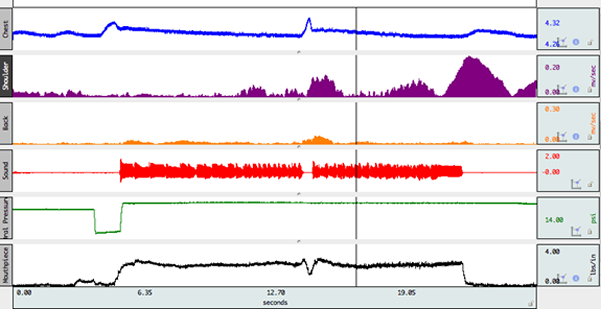
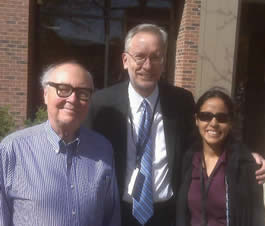
 Psych Majors.... Help us initiate a new department tradition... Follow the wafting aroma of fresh popcorn to Beck 271 on Friday afternoons. Relax and enjoy.
Psych Majors.... Help us initiate a new department tradition... Follow the wafting aroma of fresh popcorn to Beck 271 on Friday afternoons. Relax and enjoy.